| @wehaitians.com | |
No one writes to the tyrants | |
HistoryHeads/Not Just Fade Away |
| Correspond with us, including our executive editor, professor Yves A. Isidor, via electronic mail: |
| letters@wehaitians.com; by way of a telephone: 617-852-7672. |
| Want to send this page or a link to a friend? Click on mail at the top of this window. |
|
 |
|
Posted Monday, August 4, 2009
Haitian police clash with workers seeking to be better compensated for their hard labor hours
By Jonathan M. Katz, Associated Press Writer
PORT-AU-PRINCE, Haiti - Haitian police fired tear gas Tuesday at protesters who massed outside Parliament to demand an increase in the minimum wage, saying they are unable to feed and shelter their families on less than $2 a day.
 |
| The Associated Press: Haitian police clash with workers seeking pay hike Protesters try to tear down a police barrier as they protest for higher wages outside parliament in Port-au-Prince, Tuesday, Aug. 4, 2009. Protesters demanded an increase in the minimum wage, saying they are unable to feed and shelter their families on less than $2 a day. (AP Photo/Ramon Espinosa) More Images |
|
Immediately after we went to press we learned that Haiti lawmakers increased the minimum wage, not to $5.00, as demanded by protesters, but $3.75 a day, suggesting that the minimum of $1.75 daily an employer can by law compensate an emplyee for his or hard labor hours is now a thing of the past. |
| Wehaitians.com, the scholarly journal of democracy and human rights |
| More from wehaitians.com |